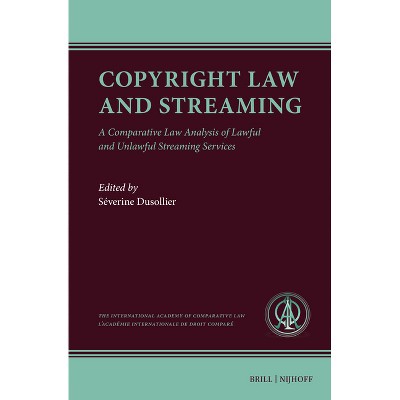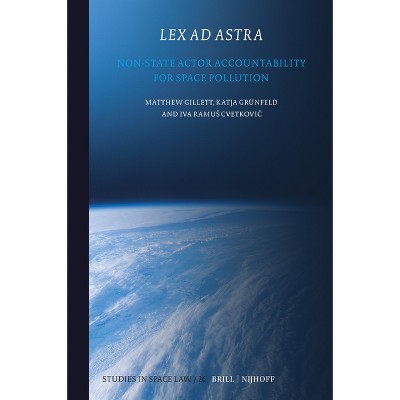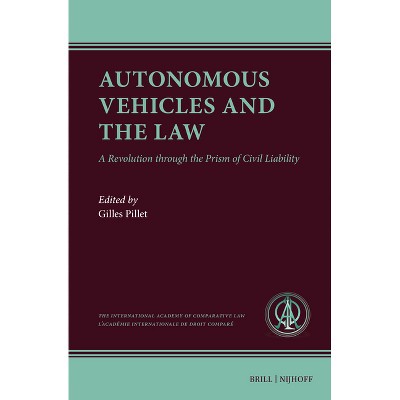Sponsored

Law: From Concept to Reality - by Darijus Beinoravič & ius (Paperback)
Pre-order
Sponsored
About this item
Highlights
- No part of the field of jurisprudence today is more lacking in legal scholarship than the concept of law, although it is eminently relevant.
- About the Author: Prof. Dr. Darijus Beinoravičius is Head of the Legal Philosophy and History Department at the faculty of Law of Mykolas Romeris University in Vilnius, Lithuania.
- 226 Pages
- Freedom + Security / Law Enforcement, Ethics & Professional Responsibility
Description
About the Book
This book addresses the gap in legal scholarship regarding the concept of law. It critiques traditional views that equated law with government mandates, exploring the impact of value shifts on human rights and the necessity of redefining law to ensure it aligns with constitutional principles.Book Synopsis
No part of the field of jurisprudence today is more lacking in legal scholarship than the concept of law, although it is eminently relevant. First, the statist concept of law that prevailed for a long time considered any government imperative as a law and transformed it into a rule of mandatory behavior. Voluntary orders of political power, rather than theoretical reasoning, determined what law was and what law a political regime needed. Questions about the essence of law were 'excluded' from the scope of jurisprudence. Second, the transition to another value system reveals the inadequacy of the proper definitions of law. Therefore, it is necessary to rethink how value reorientations affect today's security of human rights, in harmony with the prevailing concept of law. And third, under the influence of the concept of statutory law, any law was considered law. Today, the danger of such an approach is understood. The law is being assessed as to whether it complies with the Constitution and the principles of law. Only by understanding what law is can we determine what laws must be in place to consider them part of the legal system.Review Quotes
It is a complex work on the interpretation of law, paying a lot of attention to the Constitution, on which the entire system of national law is built. The monograph looks for the criteria of legality of the Constitution. It contains the basics of the hierarchy of law, the primary form of law, and the basics of any area of legal regulation. Therefore, a coherent theory of constitutional interpretation methodology is a necessity. We find the foundations of such a theory in the monograph. The reader should also be interested in the analysis of the development of law. It should be noted that the book presents not only the concept of the place and significance of the official constitutional doctrine of Lithuania, but also the scientific methodology of the evaluation of the doctrine itself. The Constitution is a law that is constantly applied, so the methodology of its interpretation is important not only for university professors or students, but also for political actors, legal practitioners, and the general public. It is also very gratifying that the monograph refers to the authorities of French legal science, whose interpretation of the opinion is very interesting and valuable.--Dr. Sophie Molinier, Maître de conférences Histoire du droit of University of Paris 8 Vincennes - Saint-Denis, France
The authoruses the comparative historical method to reveal the reasons and conditions for the emergence of the concept of law, in order to understand its essence and purpose. The lexicological research method is used to determine the meanings of the analyzed concepts. By applying the method of constructive analysis, the author does not seek to change the concept under consideration, but reveals and indicates new relationships between existing concepts. With the help of reductive analysis, the author evaluates the relationship between various concepts and the possibility of reducing some concepts to others, thus opening the possibility of critically assessing the explanatory value of both the original and the changed concept. A systematic method is also used to interpret various definitions and legal acts. The conclusions presented in the monograph correspond to the scope of the analysis performed.--Dr. Egle Bilevičiūte, Professor of public law of University of Mykolas Romeris, Lithuania
About the Author
Prof. Dr. Darijus Beinoravičius is Head of the Legal Philosophy and History Department at the faculty of Law of Mykolas Romeris University in Vilnius, Lithuania. Among his previous publications are the monographs: Rights of National Minorities (2005); Diversity of Constitutional Regulation (2006); Parliament and the Structure of State Government Institutions (2008); Law and Democracy: Democracy in Lithuania: Between West and East (1990-2007) (2009); Regnum est: To the Act of Independence of March 11, 1990-20 (2010); Constitutional Systems of the Member States of the European Union; Theoretical Foundations and Problems of Legislation (both 2012), Constitutionalism and Legal Policy in the European Union; Development of Law: Retrospective and Perspective (both 2013), Law of the Bar (2018), Comparative Constitutional Law (2016), Lithuanian Constitutional Law (2017).
Shipping details
Return details
Trending Non-Fiction











